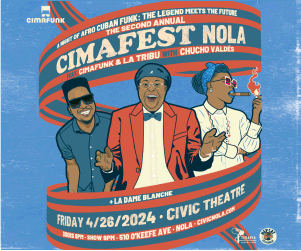In 1984, almost two generations ago, the 1984 World’s Fair took over New Orleans, and there was a ton of attention that was focused on the city. Back then, I was working for a real estate consulting firm. We evaluated the market (and sometimes financial) feasibility of real estate developments throughout the city, mainly hotels. See, there were predictions of hundreds of thousands of tourists who would be coming to the city for the Fair, and everybody was flipping buildings and converting them to hotels to try to capitalize on the influx of visitors. I don’t remember the exact number now, but many thousands of hotel rooms came on-line in the three years before the Fair opened.
Unfortunately once the Fair closed, the city was stuck with those hotel rooms which glutted the market and hurt business for all the hotels in the city.
There was also a thriving music scene. Tipitina’s was the music club in New Orleans; for a band to play at Tip’s was the ultimate; it was considered the pinnacle of local music clubs. And the Warehouse was the venue where you went to see big touring acts.
Wavelength was a great small music magazine that celebrated local music. But no one who wasn’t really into music even knew about it. The only newspaper in New Orleans, the Times-Picayune, didn’t even have a full-time music writer. The music scene was frankly not on the top of mind for anyone, particularly in the mainstream media. Music wasn’t important.
That changed somewhat in the years after OffBeat came on the scene. Originally designed as a pub for visitors (visitors really do think New Orleans is a hotbed of music; they did then and they do now), OffBeat quickly became the “official” music pub in the city. Jazz Fest then was the ultimate celebration of music, but as time went on, other festivals bloomed and began to prosper, most notably the French Quarter Festival, Bayou Boogaloo, Voodoo Fest and Essence Fest. So did OffBeat. So did WWOZ. And coverage of local live and recorded music started to develop too. The T-P hired a full-time music writer. So did the local weekly. Other local mags began to see music as worthy of regular reportage.
Local people started paying a bit more attention to music. It was indeed a golden age of local music. Maybe it was because the generation then was the first to make music an integral part of their lives. I’m talking about baby boomers: the first thing you set up in your apartment was your bed and your stereo system (the rest was extraneous). Music was a big part of our lives, much more so than our parents.
Keeping attention honed on how important music is became OffBeat’s (and my personal) raison d’etre. It worked…
People who appreciate local music are a relatively small but rabid group of folk who support the live scene, go to concerts and festivals for the music and culture (not necessarily for the beer and socializing). But the fact is that the majority of citizens in this metro area are clueless about local music and musicians. They listen to commercial radio, don’t care about local culture and the only local music they know are the regular Mardi Gras music that’s been around since forever.
So the golden age of local music may be over. Some of the “legacy” clubs who used to thrive are either closed or are struggling. Frenchmen Street became a music mecca. St. Claude Avenue is developing another scene altogether.
I would venture to guess that most legacy—as well as Frenchmen music clubs—cater to more tourists than locals. Not so—yet—on St. Claude. But then, St. Claude attracts more people who have moved to New Orleans in the past five years than visitors.
The city’s music and music scene is changing.
The Times-Picayune no longer has a full-time music writer. Neither does Gambit. The Advocate does, but music coverage is more about acts passing through town than local musicians.
The interest in music has peaked, and now it seems to have fallen off again.
Marketing the city’s music doesn’t seem as important, when one peruses the marketing campaign of New Orleans & Co., the new moniker for the convention and visitors’ bureau, there’s no music. Food seems more important to promote.
And there are hundreds of expensive condos and apartments being constructed in the city, especially the Central Business District. Will they all be occupied by locals, or will they all be converted to short-term rentals? Have they been overbuilt with the tech and hospital hype, like what happened after the 1984 World’s Fair? Are we going to be a city of pied-a-terres for the rich and connected (or the less fortunate who pay their rents with AirBnB rentals)?
New Orleans is being gentrified, and so is her culture and music.
All we can do is to start at the bottom and educate the recently-moved, and the younger generations on why New Orleans is, always has been, and should remain a cultural outlier. Unique and different is good. It’s what sets us apart and what creates the richness of our lives.
Becoming another Austin or San Francisco is not what our goal should be, in my opinion.




